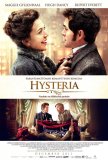Hysteria (United Kingdom, 2011)
May 17, 2012
Hysteria's "hook" is that it chronicles the development of one of the 20th century's most popular home appliances: the vibrator. However, although the details surrounding the deplorable state of women's medicine during the Victorian era are intriguing, the central story - a romantic comedy between a progressive woman and a forward-thinking doctor - is flaccid. Hysteria comes across as a rather superficial brand of art house comedy that offers moderate entertainment value but little more. Lack of character interaction dims the romance; the feeble climax doesn't justify the effort expended to get to that point.
The movie opens in 1880 London and features real-life characters in largely fictionalized situations. Dr. Mortimer Granville (Hugh Dancy), the man recognized by history as the inventor of the first electromechanical vibrator, is the protagonist. From the opening moments, we recognize him as a physician on the cutting edge of medical science. He begins working for Dr. Robert Dalrymple (Jonathan Pryce), who specializes in relieving mild "hysteria," an affliction that affects up to 50% of the female population. Dalrymple's solution to the problem is straightforward: he manipulates the woman's genitals with his fingers until she experiences a "paroxysm." Then she's sent home (usually after making an appointment for a follow-up). Mortimer quickly gets the hang of this but discovers the work to be taxing on his right forearm and hand. So, with the help of his friend, Edmund St. John-Smythe (Rupert Everett), he develops a mechanical device to simplify the task. It is an immediate sensation.
Dalrymple has two daughters: the demure, obedient Emily (Felicity Jones) and the rebellious socialist Charlotte (Maggie Gyllenhaal). Dalrymple champions a possible marriage between Mortimer and Emily, but the young doctor finds himself more drawn to the fiery Charlotte. She understands exactly what her father is doing: masturbating frustrated women to orgasm because they receive no sexual satisfaction from their husbands. Her life's passion consists of building a center for the downtrodden and homeless - a venture that is in desperate need of money and a doctor. When she asks for Mortimer's help, however, he is forced to decline because of Dalrymple's opposition to what he views as a waste of time and effort.
The characters in Hysteria are broadly drawn. Mortimer is a nice guy - a 20th century doctor stuck in the 1880s who gently fights social conventions because he wants to help people. Charlotte is a firebrand who fights for equal rights for women long before it was popular. And Dalrymple is presented as superficial and greedy; his only concern is growing his exclusive female patient list and making sure they return regularly. Background details are occasionally provided in an attempt to "flesh out" the individuals populating the screen, but nothing accomplished by director Tanya Wexler effectively humanizes any of them. They remain the two-dimensional constructs of an underwritten screenplay.
Jonathan Pryce and Maggie Gyllenhaal do nice jobs filling their roles. (Gyllenhaal boasts a credible British accent, a rarity for Americans.) The same cannot be said of Hugh Dancy, whose interpretation of Mortimer is fatuous. His wide-eyed naiveté quickly grows tiresome. There's little chemistry evident between Gyllenhaal and Dancy. These two give off so little heat they would have trouble starting a fire even with brittle kindling and a ready tinderbox. Their romance plays a significant enough part in the proceedings that the inability of the actors to convince us of a simmering attraction makes the movie feel incomplete.
One of Wexler's goals is to illustrate the lack of understanding of women's health issues by a male-dominated medical establishment. "Hysteria," as it was called, was abolished as a legitimate diagnosis in the 1950s, as was the treatment. By making Charlotte a feminist and Mortimer sympathetic to her cause, Hysteria is able to contrast the work of "serious" medicine with that of the faux clinic run by Dalrymple. The invention of the vibrator is a subplot; its most interesting contribution to Hysteria occurs during the end credits when we are presented with a pictorial history of the vibrator from its invention to the modern day.
Hysteria relies on safe, predictable comedy for its laughs. As one might expect from a film of this nature, the most "riotous" moments occur when proper-looking society women experience "paroxysms" in Dalrymple's private chambers and when a prostitute tests the prototype vibrator. (Note: face shots only.) Perhaps conservative viewers might find this material edgy or shocking but it is far from explicit. The MPAA has awarded Hysteria an R largely because anything that deals frankly with any sexual matter is deemed too adult for the more appropriate PG-13. Then again, it's hard to imagine any teenager caring enough to want to see Hysteria. This is predominantly for the art house audience as a stopgap before better, higher profile offerings are available.
Hysteria (United Kingdom, 2011)
Cast: Hugh Dancy, Maggie Gyllenhaal, Jonathan Pryce, Felicity Jones, Rupert Everett
Screenplay: Stephen Dyer & Jonah Lisa Dyer
Cinematography: Sean Bobbitt
Music: Gast Waltzing
U.S. Distributor: Sony Classics
U.S. Release Date: 2012-05-18
MPAA Rating: "R" (Sexual Content)
Genre: ROMANCE/COMEDY
Subtitles: none
Theatrical Aspect Ratio: 2.35:1

Comments